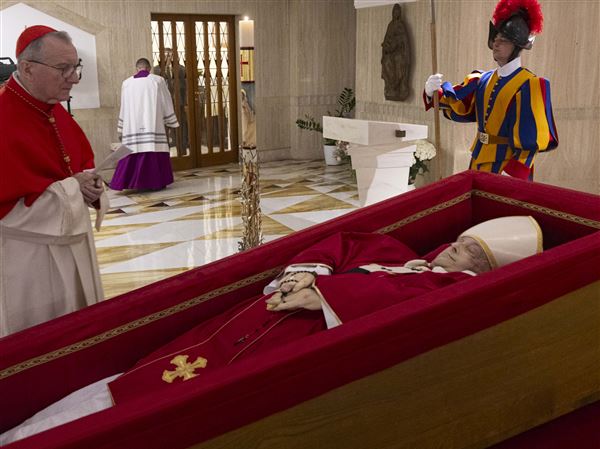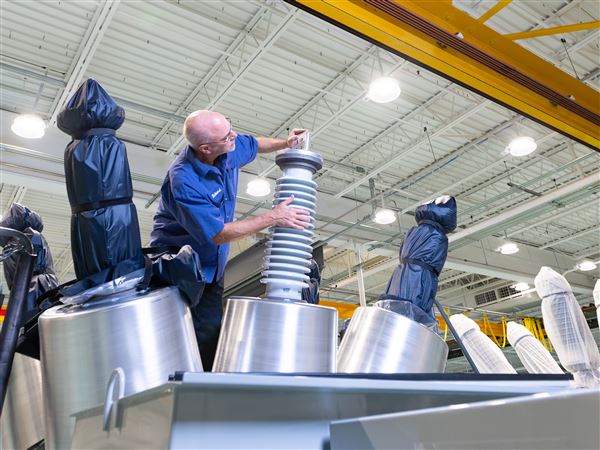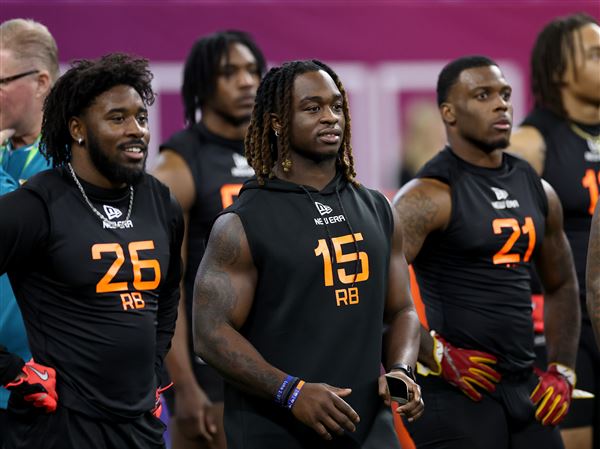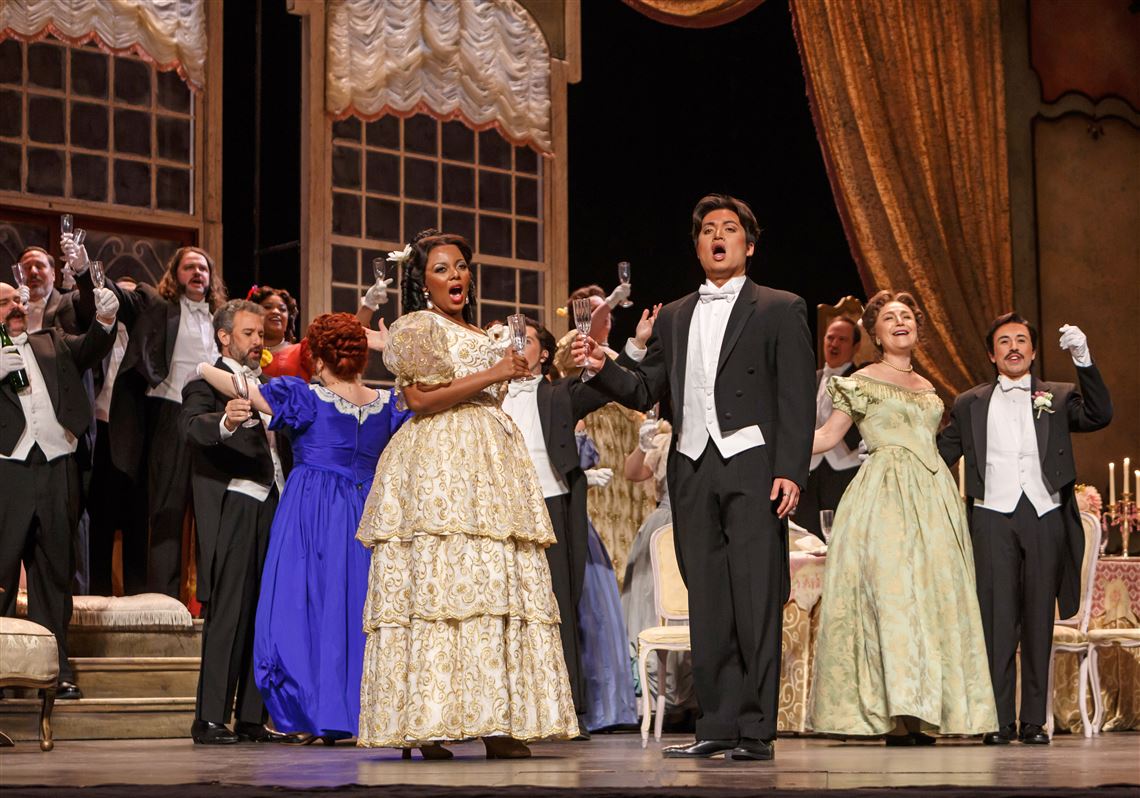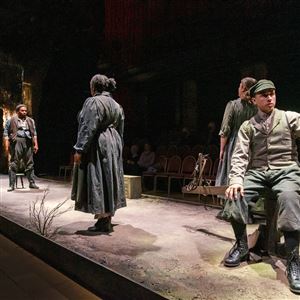Many of the attendees at Pittsburgh Opera’s opening night spent intermissions buzzing and murmuring in the common areas of the Benedum Center.
The subject? The soprano, of course.
In Verdi’s blue-chip tragic opera “La Traviata” (“The Fallen Woman”), South African soprano Vuvu Mpofu made a spirited, sparkling Pittsburgh debut as the lead role, the courtesan with a heart of gold, Violetta. From her first entrance, she distinguished herself with a level of nuance and lightness that was missing in some of the other cast members’ performances. Her character’s development from a flighty bit of arm candy to a passionate woman ensnared by both love and consumption elevated an elegant, refined and perhaps a touch restrained production just beyond the sum of its parts.
Excellence in any field demands attention and discussion, ideally over cocktails.
So raise a glass and dive in: What separates her voice and performance from her costars? What metrics are the “opera buffs” using to evaluate and discuss her strengths?
The plot
First, all hail Verdi (1813-1901), the late-blooming Italian king of opera, and the stunning lyricism of Violetta’s role.
Opera companies rank the popularity of operas in terms of revenue and attendance — “Traviata” ranks up with other blue-chip operas like Mozart’s “Marriage of Figaro,” Puccini’s “La boheme” and “Madama Butterfly” and other familiar titles.
“Traviata’s” primary appeal is in the three-dimensional nature of Violetta’s character. The plot kicks off with a whirling, glittering party scene. (It’s a bit meta, a reflection of the opera-going experience.) A party guest, Alfredo, approaches Violetta and declares his love. She’s reticent at first, but relents, and this causes all manner of drama for the suitor’s family. The father intervenes, and Violetta nobly gives up her claim during the second act, only to pass away at the close in Alfredo’s embrace.
It's the transformation of the voice, from coquettish and whimsical to righteous and powerful, that’s so identifiable. Mpofu exemplified the journey with grace and charm, creating a believable journey of a woman who abandons trysting for true love.
(As an aside, the first performance of “Traviata” in 1853 failed due to a miscast soprano, who was so ... corpulent ... audiences couldn’t believe she was dying of consumption, not to mention the scandalous subject of a sexually promiscuous protagonist.)
The voices
Mpofu’s vocal melodies held great nuance and range. She often began lines softly before adding zest and power, and initially light colors in her timbre deepened as her ardor for Alfredo intensified. This is intensely difficult and takes years of training — it’s worth taking a moment sometimes to remember how absurdly impressive these singers’ voices are.
Alfredo, alas, performed by Duke Kim another Pittsburgh debut, was less successful. He sang with a butter-smooth tenor, but lacked the jealous ferocity and gravitas that would have added empathy to his character. His voice didn’t quite fill the hall (perhaps opening night jitters, perhaps a miscast), most noticeably in a less than al dente rendition of the famous drinking tune “Libiamo ne' lieti calici,” one of those opera tunes that’s still quite present in the public consciousness. Personally, I’d prefer a brighter, brawnier take.
Alfredo’s father, however, sang by Michael Chioldi, blew off the roof with his vocal power and captured the ear with his shading of the character. Again, there was nuance, here — a father concerned for his children is won over by the nobility of the “fallen woman.” The plot is melodramatic by modern standards, of course, but the music is compelling in bringing such complexities to life.
Kudos also to chorus master Mark Trawka and the chorus, tight and Friday as I’ve yet heard them in the flickering lights of the twin party scenes.
An elegant evening
Sets and costumes and the remainder of the cast ranged from opulent to serviceable, and Kristine McIntyre’s direction shone best in the intimate, passionate moments.
At the conclusion to both the second and third acts, the opera seemed to lose steam, with the orchestra (led by Antony Walker) sounding more like window dressing than a force, almost as though they were being held back by an artificial leash.
These forces combined to create a visually and aurally sumptuous evening, albeit one that could have used just a bit more caffeine in its largest moments. Mpofu, however, was the linchpin that sold the evening with her portrayal of the heroine’s journey, and her second act duets with Chioldi are opera at its most passionate.
Pittsburgh Opera has a knack for nailing an element or two of each production with style and panache — either a brilliant casting or lighting or sets or costumes — and providing reasonable quality in the rest of the production. It’s not the same budget or quality one sees at larger cities, but that knack keeps each production special in its own way.
Next season, the opera has reduced the number of productions from the traditional six to five because of costs outpacing revenue, a widespread issue in the performing arts at present.
This production of “Traviata” is an elegant reminder of why this is a tragedy.
This performance repeats Tuesday at 7 p.m., Friday at 7:30 p.m. and Sunday at 2 p.m. Tickets begin at $15 at pittsburghopera.org.
Jeremy Reynolds: jreynolds@post-gazette.com. His work at the Post-Gazette is supported in part by a grant from the San Francisco Conservatory of Music, Getty Foundation and Rubin Institute.
First Published: March 17, 2024, 3:35 p.m.
Updated: March 18, 2024, 2:03 p.m.
